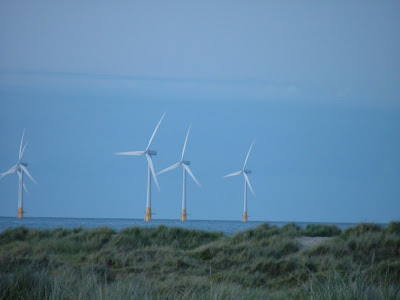
Thinking about My Town Monday, I started to think of something I could use as subject matter. I was beginning to think that I had covered just about everything, when I realised there is a whole area of 'stuff' that I haven't touched on - Shopping, a national past time. We in Hertfordshire can boast to being the home of the international Supermarket Chain TESCO's
Above is a photo of my local Superstore, Tesco Extra, at Hatfield.
So a brief history of one of the UK's most successful and possibly one of the most controversial shops.
Tesco plc is one of the largest retailers in the world, operating more than 2,300 supermarkets and convenience stores and employing 326,000 people. Tesco's core business is in Britain, where the company ranks as the largest private sector employer in the United Kingdom and the largest food retailer, operating nearly 1,900 stores. In continental Europe, Tesco operates in the Czech Republic, Hungary, Poland, the Republic of Ireland, Slovakia, and Turkey. In Asia, the company operates in Japan, Malaysia, South Korea, Taiwan, and Thailand. Through Tesco.com, the company ranks as the largest online supermarket in the world. The company also offers financial services through Tesco Financial Services, which controls 4.6 million customer accounts roughly divided between credit cards and car insurance policies. Through the more than 100-unit Tesco Express chain, the company ranks as the largest seller of petrol in the United Kingdom.
Early History.
In founder John Edward (Jack) Cohen's day, a retailer's product line was comprised of whatever could be housed in a tiny stall. In 1919, Cohen invested his £30 stipend from his World War I service in the Royal Flying Corps in stock for his small grocery stall in the East End of London and began his career as a market trader. He soon became a successful trader in other London markets outside of the East End and also branched out into wholesaling for other market traders. In 1932, Cohen officially founded Tesco Stores Limited. The name was originally that of a private-label brand of tea Cohen sold, created from the initials of T.E. Stockwell, a merchant from whom he bought tea, and the first two letters of his last name.
Over the next eight years, the company grew rapidly, as Cohen opened more than 100 small stores, mainly in the London area.
By 1976, Tesco operated nearly 900 supermarkets and superstores on the "pile it high, sell it cheap" formula that Cohen had imported from America. The firm's management found that the effectiveness of this strategy had deteriorated over time, however, leaving the company with uncomfortably slim margins and a serious image problem among consumers. While Tesco had been preoccupied with opening as many stores as possible and loading them with merchandise, the company had missed important signs that its market was changing and had come to value merchandise quality over quantity.
Tesco had to take action to raise the profile of the company (this is where they started to look at world domination as an ambition!!) or they would go out of business.
By the beginning of the 1990s, Tesco had 371 stores in England, Scotland, and Wales--150 of which were superstores--and the company had become one of the United Kingdom's top three food retailers. The early 1990s saw the culmination of Tesco's fight for market share fueled in part by a two-year £1 billion development program launched in 1990 which added about 60 new stores and more than 2.3 billion square feet of store space. By 1991, Tesco had become the largest independent petrol retailer in Great Britain. Four years later, the company reached the number one spot among food retailers in terms of market share.
In 2000, Tesco launched its e-commerce business, Tesco .com, one of several new business developments that propelled the company's financial growth during the early years of the 21st century. The company's grocery home-shopping service quickly developed into the largest of its kind in the world. While its retailing services segment gathered steam, Tesco turned to developing its nonfood business. The company began stocking electronic products, toys, sports equipment, cookware, and home furnishings in its stores.

So why is this successful store disliked by some people?? Well they have a habit of not always fulfilling their obligations, they buy huge amounts of land close to town and promise in return for planning permission to build a store to provide a community asset such as a swimming pool or sports centre. quite often once the store is built the promised asset doesn't appear causing much bad feeling all around. If they fail to get planning permission they do nothing with the land and let it fall into decay and disrepair which in turn reflects on the rest of the area.
I, actually quite like them and their products!! (and their loyality card which means free holidays!!)










































